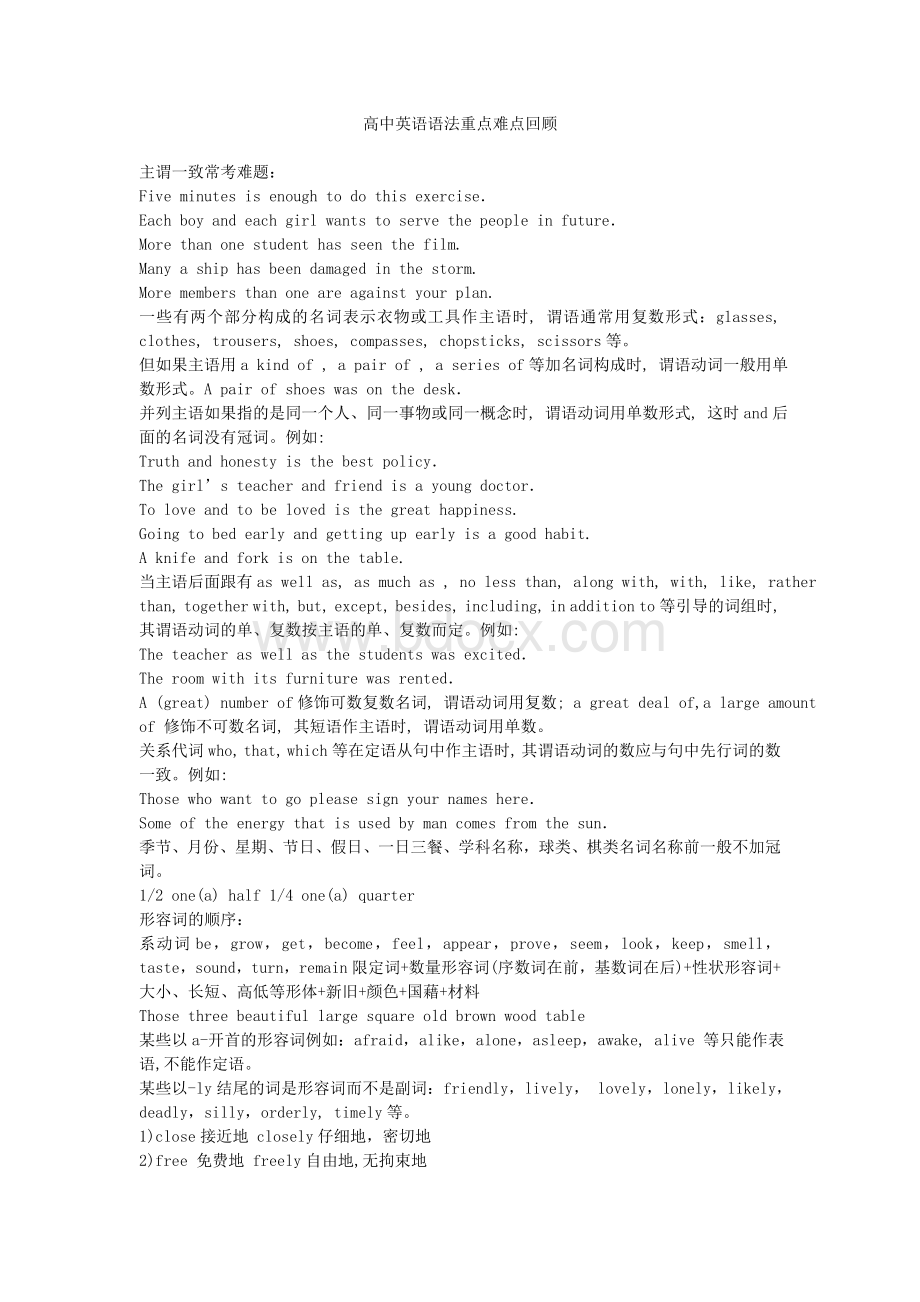高中英语语法重点难点回顾(免费).doc
《高中英语语法重点难点回顾(免费).doc》由会员分享,可在线阅读,更多相关《高中英语语法重点难点回顾(免费).doc(7页珍藏版)》请在冰豆网上搜索。

高中英语语法重点难点回顾
主谓一致常考难题:
Fiveminutesisenoughtodothisexercise.
Eachboyandeachgirlwantstoservethepeopleinfuture.
Morethanonestudenthasseenthefilm.
Manyashiphasbeendamagedinthestorm.
Moremembersthanoneareagainstyourplan.
一些有两个部分构成的名词表示衣物或工具作主语时,谓语通常用复数形式:
glasses,clothes,trousers,shoes,compasses,chopsticks,scissors等。
但如果主语用akindof,apairof,aseriesof等加名词构成时,谓语动词一般用单数形式。
Apairofshoeswasonthedesk.
并列主语如果指的是同一个人、同一事物或同一概念时,谓语动词用单数形式,这时and后面的名词没有冠词。
例如:
Truthandhonestyisthebestpolicy.
Thegirl’steacherandfriendisayoungdoctor.
Toloveandtobelovedisthegreathappiness.
Goingtobedearlyandgettingupearlyisagoodhabit.
Aknifeandforkisonthetable.
当主语后面跟有aswellas,asmuchas,nolessthan,alongwith,with,like,ratherthan,togetherwith,but,except,besides,including,inadditionto等引导的词组时,其谓语动词的单、复数按主语的单、复数而定。
例如:
Theteacheraswellasthestudentswasexcited.
Theroomwithitsfurniturewasrented.
A(great)numberof修饰可数复数名词,谓语动词用复数;agreatdealof,alargeamountof修饰不可数名词,其短语作主语时,谓语动词用单数。
关系代词who,that,which等在定语从句中作主语时,其谓语动词的数应与句中先行词的数一致。
例如:
Thosewhowanttogopleasesignyournameshere.
Someoftheenergythatisusedbymancomesfromthesun.
季节、月份、星期、节日、假日、一日三餐、学科名称,球类、棋类名词名称前一般不加冠词。
1/2one(a)half1/4one(a)quarter
形容词的顺序:
系动词be,grow,get,become,feel,appear,prove,seem,look,keep,smell,taste,sound,turn,remain限定词+数量形容词(序数词在前,基数词在后)+性状形容词+大小、长短、高低等形体+新旧+颜色+国藉+材料
Thosethreebeautifullargesquareoldbrownwoodtable
某些以a-开首的形容词例如:
afraid,alike,alone,asleep,awake,alive等只能作表语,不能作定语。
某些以-ly结尾的词是形容词而不是副词:
friendly,lively,lovely,lonely,likely,deadly,silly,orderly,timely等。
1)close接近地closely仔细地,密切地
2)free免费地freely自由地,无拘束地
3)hard努力地hardly几乎不
4)late晚,迟lately近来
5)most极,非常mostly主要地
6)wide广阔地,充分地widely广泛地
7)high高highly高度地,非常地
8)deep深,迟deeply抽象意义的“深”
9)loud大声地loudly大声地(含有喧闹的意思)
10)near邻近nearly几乎
bad/ill,badlyworseworstlittlelessleast
表示一方不及另一方时,用“less+原级+than”的结构表示:
Thisroomislessbeautifulthanthatone.
表示一方超过另一方的程度或数量时,可在比较级前加表示程度的状语,如:
even,alot,abit,alittle,still,much,far,yet,byfar等修饰:
Heworksevenharderthanbefore.
注意:
byfar通常用于强调最高级。
用于比较级时,一般放在比较级的后面,如放在前面,应在二者中间加“the”。
Heistallerbyfarthanhisbrother.
Heisbyfarthetallerofthetwobrothers.
某些以-or结尾的形容词进行比较时,用to代替than。
superior,junior,senior等。
HeissuperiortoMrWanginmathematics.
在比较从句中为了避免重复通常用that(those),one(ones)代替前面出现的名词。
that指物,one既可指人,也可指物。
that可代替可数名词单数和不可数名词,而one只能代替可数名词。
例如:
Thebookonthetableismoreinterestingthanthatonthedesk.
Aboxmadeofironisstrongerthanonemadeofwood.
表示倍数的比较级有如下几种句型:
Aisthree(four,etc.)timesthesize(height,length,width,etc)ofB.
Thenewbuildingisfourtimesthesize(theheight)oftheoldone.
这座新楼是那座旧楼的四倍大(四倍高)。
[高三倍]
Aisthree(four,etc.)timesasbig(high,long,wide,etc.)asB.
AsiaisfourtimesaslargeasEurope.亚洲是欧洲的四倍大。
Aisthree(four,etc.)timesbigger(higher,longer,wider)thanB.
例如:
Yourschoolisthreetimesbiggerthanours.
你们的学校比我们的学校大三倍。
表示两倍可以用twice或double。
表示“最高程度”的形容词,如excellent,extreme,perfect等,没有最高级,也不能用比较级。
如果复数名词前有many、few,不可数名词前有much、little等表示量的形容词时,该用so而不用such。
如:
I’vehadsomanyfallsthatI’mblackandblueallover.
MrWhitegotsolittlemoneyamonththathecouldhardlykeepbodyandsoultogether.
但little不表示数量而表示“小”的意思时,仍用such。
如:
Theyaresuchlittlechildrenthatthetheycannotcleanthehousebythemselves.
6)almost与nearly
在very,pretty,not后用nearly,不用almost。
例如:
I’mnotnearlyready.
在any,no,none,never前用almost,不用nearly。
例如:
Ialmostneverseeher.
need表示“需要”或“必须”,作情态动词时,仅用于否定句或疑问句中。
在肯定句中一般用must,haveto,oughtto或should代替。
例如:
Youneedn’tcomesoearly.
NeedIfinishtheworktoday?
--Yes,youmust.
注意:
needn’thavedone“表示本来不必做某事而实际上做了某事”。
例如:
Youneedn’thavewaitedforme.
“shouldhavedone”表示应该做到而实际上没有做到。
Youshouldhavestartedearlier.
“oughttohavedone”表示过去应做某事而实际未做。
Yououghttohavehelpedhim(butyoudidn’t)
书报的标题,小说等情节介绍常用一般现在时。
表示感觉,愿望和状态的某些动词如have,be,hear,see,like等词一般不用进行时。
有些动词形式上是主动结构,但表示被动的意思。
常见的有可和well,easily等副词连用的不及物动词sell,wash,write,read,clean,cook等。
例如:
Theclothwasheswell.这布很经洗。
Thenewproductsellswell.这新产品很畅销。
Thepenwriteswell.这支笔很好写。
在动词arrange,command,demand,desire,insist,order,propose,request,require,suggest等后面的宾语从句中用“(should)+动词原形”(虚拟语气)例如:
Wesuggestedthatwe(should)haveameeting.
Weinsistedthatthey(should)gowithus.
Thedoctororderedthatshe(should)stayinbedforafewdays.
Hedemandedthatwe(should)startrightaway.
作advice,idea,order,demand,plan,proposal,suggestion,request等名词的表语从句和同位语从句,其谓语动词要用虚拟语气的结构“(should)+动词原形”。
例如:
Weallagreedtohissuggestionthatwe(should)gotoBeijingforsightseeing.
Myideaisthatwe(should)doexercisesfirst.
在feel,hear,notice,observe,see,watch,have,let,make等词后的补足语中,不定式不带to。
但是这些句子如果变成被动结构时,就必须带